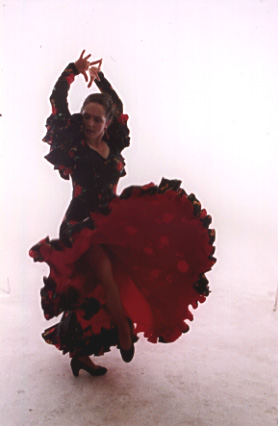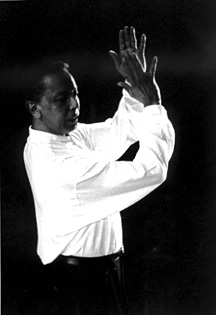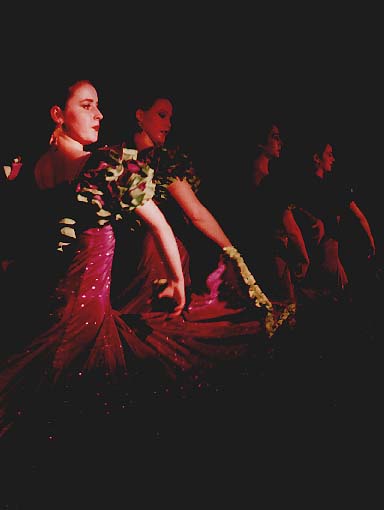Some Thoughts on Flamenco

Some Thoughts on Flamenco

|
Flamenco is the very distinctive folk song form of Southern
Spain, widely (but not always correctly) associated with the
Gypsies of Andalusia.
What makes Flamenco so distinctive from other musical styles is apparent in the performance itself, which often consists of a strident and guttural vocal technique accompanied by primitive sounding tonic progressions, polyrythmic tempos, and sensuous individual dancing by women and men. Its purpose is to create a mood that leads to some sort of simultaneous catharsis for performers and listeners alike--invoking the essential spirit of Flamenco, called duende. |

People who understand and appreciate Flamenco, true aficionados, revel in this experience. Others might find Flamenco difficult to listen to, put off by the intimate ventilation of such turbulent emotions as jealousy, guilt, rage, and despair--frequent themes of Flamenco Deep Song. To understand why Flamenco affects people the way it does, it may help to consider the sociology of Southern Spain at the time that it was conceived.
Near the end of the fifteenth century, when tribes of Gypsies began to arrive in Southern Spain from Europe and North Africa, Andalusian folk music was already well developed with traditions that were rooted firmly in antiquity. As the Gypsies have always done on their wanderings since leaving their native India, they adopted the musical forms of the lands they travelled through and made them their own. Nowhere did they do this with greater completeness than in Andalusia, becoming more settled there than anywhere else along their long and little understood journey. They eventually would become part of the Spanish underclass known collectively as gitanos.
But at the time of their barely-noticed arrival (circa 1492), certain other groups in Spain were going through what amounted to a holocaust. The large community of Spanish Jews, after centuries of making invaluable contributions to the intellectual, artistic, and political life of the country under Moorish and Christian rule, found themselves under a cruel expulsion order. Spanish Muslims, called moriscos, soon received the same treatment at the hands of an increasingly intolerant Christian monarchy, determined to cleanse the ethnic fabric of their society to a state of envisioned religious purity. For many of these desperate fugitives, flight into exile was not desirable or even possible. I suggest many chose a reasonable alternative: hide themselves among the dark-eyed Gypsies, who were not targeted with anywhere near the same vehemence by the fanatical Christian rulers of a newly united Spain.

As good numbers of these fugitive Jews and moriscos melted into the Gypsy camps, they took their songs with them, songs that expressed the deepest pain a people can collectively experience: the pain of being the object of mass hatred, of rejection, and of losing possession of the very earth they stand upon (not unlike the Palestinians of today). I suggest to you that the underlying sadness that is never very far from the surface in even the happier forms of Flamenco song is nothing less than the imprint of a holocaust upon a people.
More Thoughts about Flamenco...
